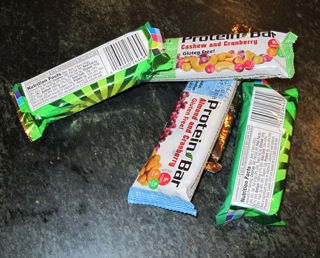Pick up any sports magazine and you will find countless advertisements for protein supplements, shakes, and bars. These ads have flashy logos to catch athletes’ attention and claim that their products increase energy and stamina, build muscle faster, and reduce soreness with no harm to the user.

According to the Center for Disease Control and Prevention, protein is a very important part of your body. It is an essential component for building and repairing healthy bones, muscles, cartilage, skin, and blood. Protein in athletes is used to repair muscle broken down during exercise.
WebMD.com suggests that teenage boys should consume approximately 52 grams of protein a day and that teenage girls should consume approximately 46 grams of protein a day. The US Department of Agriculture’s MyPyramid says that protein consumption should be between 17% and 21% of daily calorie consumption.
Dr. Teri McCambridge, chairwoman for the American Academy of Pediatrics' Council on Sports Medicine and Fitness, says in an article on livestrong.com that, “Teens especially eat more than enough protein.” She believes that teens already receive their daily protein needs by eating everyday foods and do not need the extra protein that bars and shakes provide. She says that they do not provide any health benefit to teens and are an unnecessary addition to a teen’s sport diet.
Kidshealth.org agrees with this statement saying that, “Extra protein supplements are unneeded and that having too much protein in a person’s body can actually be harmful”. Studies have shown that too much protein can cause dehydration, calcium loss, and in some cases kidney problems.
On the other hand, Dr. Rick Hursel from Maastricht University located in The Netherlands, reported in October of 2009 in the British Journal of Nutrition that protein supplements provide a higher metabolic rate in teen athletes, which in turn provides an increase in healthy muscle tissue.
Dr. John Ivy, a professor in Kinesiology and Health Education from the University of Texas at Austin, wrote in an article for livestrong.com in 2004 that, “Protein supplements promote healthy muscle recovery and reduce the risk of overtraining”. Other suggested benefits of protein supplements in teens include an improved immune system and an overall increase in health.
Apart from the suggested physical benefits of protein supplements, there is another advantage. In a 2008 study from George Washington University, published in the Journal of Psychiatric Research, researchers discovered that a higher level of protein is beneficial for both kids and teens that suffer from Attention Deficit Disorder, Attention Deficit Hyperactivity Disorder, or other learning disorders. They found that increasing the protein level in a child is an effective way to develop and raise concentration levels. Jacob Parker

This work is licensed under a Creative Commons Attribution-NonCommercial-NoDerivs 3.0 Unported License
















Great insight and succinct compilation of information.:gamba
I thought this was helpful to show how much protien a girl my age needs to consume, as well as telling me weather or not I should eat protien bars
This article was very informative.
When doing extreme workouts and after you need to refuel your body of what you took out. An hour after your workout you actually can LOSE muscle mass if you don’t replenish your body. This is why I take protein supplements and drinks. But of course you can go over board with them. So you should see a doctor on how much you should take.
Very well written and very informational
Why does some research show that protien can be helpful to teens while others suggest that it is harmful?
Great article. it really informed me over protien in teens.
This article had a lot of good points and ideas!
This is a great article. It shows the goods and bads. Good work!:smile
Very good information, great insight, and very helpful for teens and athletes.:gamba
very good article! it ws interesting and good facts to know, lots of information given.
I really enjoyed your article. :good
I found the article very informative on the benefits and health risks whith proetin supplements for teen atheletes. The only question I have is one brand of proetin supplements better than others and why ?
I found this article very informative considering I am a teen athlete.
It was really good and i have learned that u can succeed in SPORTS by using protein everyday…
very informational and helpful facts about protein use and protein in general.
I like this artical because it is well writen. It is very interesting to me, because i am a teen athelete
How often does protein supplement should be taken, everyday or only on the days that muscle exertion was performed? Because it is too much too to go weighlifting everyday.
great info. Good facts too